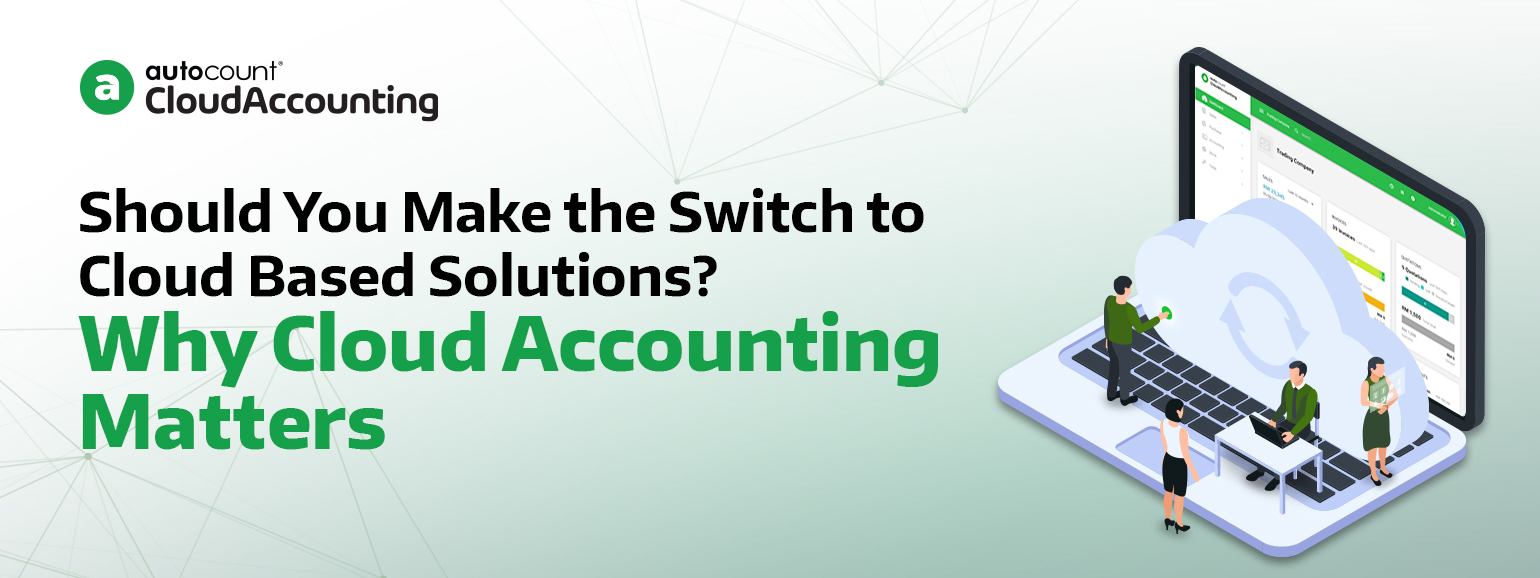
Should You Make the Switch to Cloud Based Solutions? Why Cloud Accounting Matters
Did you know 54% of Malaysian SMEs use digital solutions like cloud computing and data analytics to compete in the business?
Within the broad umbrella of cloud computing, cloud accounting has emerged as one of the most practical and impactful solutions for SMEs.This significant technological shift enables businesses to store, manage, and process data without relying on physical infrastructure.
It doesn’t just simplify bookkeeping but transforms how businesses manage cash flow, compliance, and decision-making.
Cloud Computing in Malaysia: A Growing Trend
The Malaysian government has been actively encouraging digital adoption through initiatives like MYDigital and the Digitalisation Grant. These programs highlight cloud computing as a backbone technology for the country’s transition into a knowledge-based economy.
As more SMEs embrace digitalisation, cloud accounting is increasingly seen as the natural first step. Unlike more complex enterprise solutions, cloud accounting directly addresses day-to-day financial needs, making it both accessible and highly beneficial.
A retail SME, for instance, can now issue e-Invoices directly from a cloud accounting system, which are automatically sent to customers and reported to tax authorities. This saves time, reduces errors, and ensures full compliance with Malaysia’s digital tax requirements.
Traditional Accounting vs. Cloud Accounting
Many SMEs in Malaysia still rely on traditional desktop-based accounting software or even manual spreadsheets. While these methods may be effective initially, they present significant limitations as businesses expand. Here, we highlight why cloud accounting is a must for SMEs aiming to scale sustainably.
| Traditional Accounting | Cloud Accounting |
|---|---|
|
Records kept in books or spreadsheets |
Accessible from anywhere, on any device |
|
Data backups and updates done manually |
Automatic, real-time backups in the cloud |
|
Limited collaboration |
Multiple users can access data |
|
High upfront setup costs |
Pay-as-you-go subscription model |
|
Risk of non-compliance features |
Always updated with the latest regulations |
Key Benefits of Cloud Accounting for SMEs
- Work faster:
With cloud accounting, there’s no need for expensive hardware that requires long term and constant fees. SMEs can subscribe to a plan that fits their budget and scale up only when needed.
- Access Anytime, Anywhere
Cloud accounting platforms allow business owners and accountants to log in from the office, home, or even overseas. This flexibility is particularly valuable in today’s hybrid and remote work environments.
- Real-Time Financial Visibility
Instead of manually writing your reports or having to hire an accountant, cloud accounting provides live dashboards and up-to-date financial data. Owners can instantly track cash flow, monitor expenses, and make informed decisions.
- Stronger Compliance
Malaysia’s tax environment requires SMEs to stay compliant with SST and, more recently, the government’s phased e-Invoice implementation by LHDN. Certain cloud accounting solutions are usually frequently updated to reflect the latest compliance requirements, ensuring SMEs can issue and manage e-Invoices directly from the system without additional manual work.
- Enhanced Security and Reliability
Depending on the solutions provider, the system sometimes includes robust safeguards such as encryption, firewalls, and two-factor authentication. Combined with automated backups, this ensures financial data is far more secure than spreadsheets stored on a single computer.
- Collaboration Made Easy
Accountants, managers, and even external auditors can access the same system simultaneously, reducing bottlenecks and eliminating version-control issues common with offline files.
The Future of Business is in the Cloud
Globally, cloud based solutions are set to keep growing. According to Gartner Research, more than half of enterprises' spending will shift to cloud solutions by 2026. In Malaysia alone, plans for accelerating digitalisation such as e-Invoicing are now mandatory across businesses.
Cloud accounting systems are also designed to integrate seamlessly with e-Invoice workflows, making them the most future-proof choice for SMEs looking to stay ahead of regulatory changes.
Don't make the mistake of falling behind! For Malaysian SMEs, early adoption of cloud accounting means staying ahead of competitors, being ready for regulatory changes, and building resilience against disruptions.
Getting Started with Cloud Accounting
While cloud computing covers a wide range of applications, cloud accounting is the most impactful starting point for Malaysian SMEs.
Transitioning doesn’t have to be complicated. SMEs can begin by:
- Identifying Needs: Start with core functions such as invoicing, expense tracking, and reporting.
- Choosing a Trusted Provider: Select a solution that supports local compliance, offers scalability, and provides user-friendly features.
- Onboarding Your Team: Proper training ensures smooth adoption and maximises value.
- Expanding Gradually: Move additional processes like payroll, inventory, and budgeting onto the platform as your business grows.
If you’re ready to future-proof your operations, AutoCount Cloud Accounting offers a secure, scalable, and user-friendly solution designed specifically for Malaysian SMEs.
With features like SST compliance, automated updates, and powerful reporting, it’s the ideal partner to help your business thrive in the cloud era.